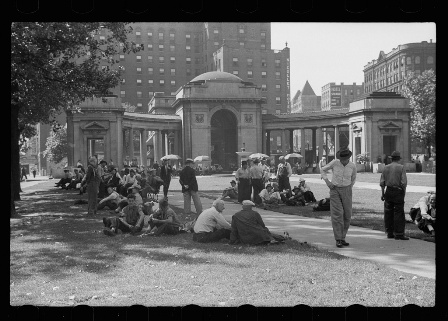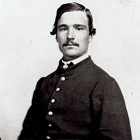
August 19, 1936
“Hjalmar Petersen takes office as the state’s 23rd governor upon the death of Governor Floyd B. Olson. Following his short stint as governor, Petersen tries and fails four times to regain the office.” *
“Hjalmer Petersen, the twenty-third governor of Minnesota, was born in Eskildstrup, Denmark on January 2, 1890. His education was limited and attained in the common schools of Denmark and Minnesota. At fourteen years old, he left school and went to work in the newspaper business, eventually founding the Askov American in 1914, a newspaper he owned the rest of his life. Petersen first entered politics as the clerk and then mayor of Askov. He also served as a member of the Minnesota House of Representatives from 1930 to 1934, and was the lieutenant governor of Minnesota from 1934 to 1936. On August 22, 1936, Governor Floyd B. Olson died in office, and Petersen, who was the lieutenant governor at the time, assumed the duties of the governorship. During his tenure, the federal unemployment insurance law was initiated; several labor disputes were dealt with; and significant judicial appointments were approved. After serving 134 days as governor, Petersen left office on January 2, 1936. He continued to stay politically active, serving as a member of the State Railroad and Warehouse Commission, a position he held until 1966. He also made several unsuccessful bids for the governor’s office, as well as a 1958 run for the U.S. Senate. Governor Hjalmar Petersen passed away on March 29, 1968 in Columbus, Ohio.” **
What did Governor Petersen’s keystone legislation of unemployment look like in his era? Minnesotans who were discharged through no fault of their own were to receive $15 a week for up to 16 weeks as of May 1,1938.*** See the table below to compare and contrast what this amount meant to a worker back at its commencement.****

Shall we pray? Lord, we give You thanks for being the Governor of All, for being our shield and very great reward! We agree with Your covenant promises in Genesis 15 to Abraham and his children that Your favor is greater than the sum of all property, labor, and accomplishments. We remember and bless Your eternal words, and Your heart of unmerited goodness to all who believe!
Will You forgive us our broken trust in Your provision both in Governor Petersen’s era, and in the present? We have accepted wealth from the state that it does not create or own, but extracted from our neighbors. We have accepted the premise that our present condition of dysfunction becomes the problem of our functional neighbors. Will You forgive us this faulty logic and co-dependent relationship(s)?
What if the state had made unemployment insurance voluntary instead of mandatory? We can see at least three immediate benefits immediately from this premise. First, it would allow contributors to share their wealth freely with a true spirit of giving instead of the spirit of extortion through forced charity collected by the state.
Secondly, it would remove politicians from the direct relationship between those with extra and those in need. Maybe this would remove a sense of entitlement of guaranteed benefits, and enable a sense of gratitude and trust towards givers from receivers because they would have no expectations?
Third, it would displace politicians’ from the false narrative that they were the givers of wealth, and undercut the credit they have taken for the gifts of others.
Will You forgive us for trusting in the politicians of Minnesota, and the provisions forced on our neighbor by the co-dependent law of unemployment insurance? We have assumed a co-dependent relationship between giver and receiver and state. Will You help us revisit these issues and remove the expectations, dependency, shame, and manipulation from helping each other? Will You remove what is false and create real relationship, real opportunity to give from the heart, and real gratitude? Will You fulfill the good intentions and desires of Hjalmer Petersen on Your terms, and show us a better, more honest way to love our unemployed neighbor?
“Each of you should give what you have decided in your heart to give, not reluctantly or under compulsion, for God loves a cheerful giver.” 2 Corinthians 9:7 NIV
* http://www.mnhs.org/about/dipity_timeline.htm
** https://www.nga.org/governor/hjalmar-petersen/
citing Sobel, Robert, and John Raimo, eds. Biographical Directory of the Governors of the United States, 1789-1978, Vol. 2, Westport, Conn.; Meckler Books, 1978. 4 vols.
*** https://www.ssa.gov/policy/docs/ssb/v48n10/v48n10p22.pdf
**** http://www.mybudget360.com/cost-of-living-1938-to-2015-inflation-history-cost-of-goods-inflation/








